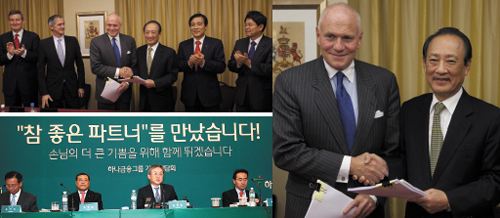Hana¡¯s Acquisition of KEB Signed and Sealed
The move changes banking landscape with Hana moving up to third largest overtaking Shinhan

Hana Financial Group is looking for strategic investors in Korea Exchange Bank (KEB) now that it has signed a final agreement to take over the bank by acquiring 51.02 percent from Lone Star, the U.S. hedge fund, for roughly 4.7 trillion won.
The deal was signed in London by Chairman Kim Seung-yu of the Korean financial group and his counterpart at the U.S. stakeholder, John Grayken, at his London office, President Kim Jong-yeul announced on Nov. 25.
Chairman Kim Seung-yu, upon his return to Seoul on Nov. 26, said now that the banking sector has been taken care of with the takeover of KEB, Hana now should look into expanding its non-banking sector by securing an insurance firm through an M&A. He said Hana will watch the insurance industry for possible takeover targets under a strategy to be drawn up soon.
Hana has been operating an insurance firm that was set up jointly with HSBC named Hana-HSBC Life Insurance Co., but it ranks 20th in terms of market share, with only 1 percent of the Korean market, and total assets of only 1.3 percent of Hana¡¯s total assets.
Kim said Hana will look for investors to secure the necessary funding for the purchase of KEB, including investment by the National Pension Service if necessary. He denied reports that Hana will accept investments from foreign hedge funds, saying that he has never even talked about it in the open, since Hana can meet the 4.6 trillion won to 4.7 trillion won cost of the purchase with its own funds without much trouble. But Hana will look for foreign investors until the March due date.
Reports also indicated a Chinese bank has been keen on investing in KEB since Hana plans to upgrade its capacities all around by introducing advanced financial technologies and acquiring strategic partners in line with its long-term development plans. They said the group has in mind a total shakeup of its operational structure under a long-term plan, not limited to the acquisition of KEB, and a foreign partner may be necessary from that perspective. They said Hana may announce where it stands on the matter soon, although no firm decisions have been made.
Hana held an investors¡¯ session in London on Oct. 26 for potential foreign investors, during which it suggested the possibility of Hana issuing new shares. Foreign investors were said to have shown a positive interest in Hana¡¯s plan. The number of applications by foreign shareholders to make additional investments bears out the success of the projected plan and Hana intends to screen all of the applications and select the investors to participate in its plan.
In this connection, reports said HSBC might be one of the foreign banks that feels good about investing in Hana and becoming a strategic partner. Hana officials, however, said Hana has not even considered HSBC as its partner, although the British bank has a joint venture with Hana, Hana-HSBC Life Insurance. Reports also indicated that Temasek might be a financial investor for Hana, which sold all of its shares in Hana.
The chairman also ruled out a large personnel shake up at KEB, saying Hana traditionally has not stuck to a so-called ¡°pure blood¡± personnel system, which favors those who entered the bank through public employment tests, but has always looked for the best-qualified personnel both at home and abroad. What he meant was that Hana will hire personnel outside the system if needed, but not when the current employees have been doing a good job.
As to his future moves, he said he has been with Hana since a time when there were only 20 employees, several decades ago, and Hana itself is his life. His term of office expires in March of next year.
Hana¡¯s financial assets will rise to 316 trillion won with the addition of KEB, bringing it to third in the financial industry. Hana is counting on synergy created from the merger, combining Hana¡¯s expansive personal loan market share and KEB¡¯s corporate loan sector, hoping to grow to rank among the 50 largest financial groups in the world by 2015.
Hana will make efforts to have each one of its banking businesses to lead other banks in the country to strengthen its portfolio since the two banks¡¯ banking outlets have been boosted to 1,004 around the country, second to Kookmin Bank, with overseas banking facilities numbering 37, the largest among the four major banks in Korea.
Hana counts on the increased number of its overseas financial network to help cut its fund borrowing costs overseas by achieving an economy of scale.
Hana will take advantage of KEB¡¯s extensive know-how in corporate banking, trade financing and overseas banking combined with Hana Bank¡¯s better personal banking, asset management, insurance and securities operations to create synergy among the two banks.
Hana also plans to strengthen the credit card sector including Hana SK Card and the KEB Card by expanding their credit card and asset management capacities.
Hana, however, plans to gradually merge its banking operations, although KEB will be independently managed separately from Hana Bank with its original name since their operations do not duplicate much, ruling out readjustment and restructuring.
Hana officials said it will be possible for both Hana and KEB to exchange information and know-how on banking services, which will lead to upgrading the capacities of each of its business sectors such as corporate financing, foreign exchange, personal finance and private banking, among others.
With Hana taking over KEB, the nation¡¯s banking industry will have four major banks with nationwide branch networks, making Hana the third largest bank in Korea in terms of assets, which will have swollen to 316 trillion won after the merger. It will move up to the second spot when Woori Financial Group is privatized and Kyungnam Bank and Gwangju Bank are separated from the group, reducing Woori¡¯s total assets by 4 billion won, industry sources said.
Hana Bank, before its take over of KEB, had been lagging behind its competitors in terms of operational scale, but now that it has acquired KEB it can compete on equal terms with other major banks, the sources speculated.
They said Hana, with synergy created from KEB, could put its rival banks in tough corners. The Korean banking industry is expected to follow the path taken by the banking industries in Australia and Canada, which have similar banking industry patterns as Korea¡¯s with several banks dominating the industry.
The sources pointed out that Australia and Canada emerged from the global financial crisis with stronger banking industries and the Korean banking industry is ready to weather any kind of global financial crisis that might sweep the world.
But there are still factors that could change the prospects including the privatization of Woori Financial Group and the Korea Development Bank. If Woori Financial Group continues to fail to sell a majority of its shares to private investors, it will gradually lose its competitive edge and ultimately change the banking landscape with three stronger banks and one weaker one. If a major bank takes over KDB, it will be the only super strong bank in Korea.
Another factor that could change the current banking lineup is the future of Shinhan Bank, which has been under investigation by the prosecution involving its top three CEOs for alleged violation of the banking regulations.
The bank¡¯s future development will change the current banking landscape irretrievably and the major banks will be thrown into a tough competition for survival with Hana Bank put into a favorable position to take over as the top bank in the country.
The banking community will be pushed back to where it was in 2006 when Shinhan Bank acquired Chohung Bank, igniting a tough competition in the industry. Already there are reports that Chairman Euh Yoon-dae of KB Financial Group has been touring the Gyeongnam region and Busan to secure more customers for affiliates of the group. The sources said they will not be surprised if a bank drops out of the competition with not enough resources to survive. nw
(clockwise)High-ranking executives of both Hana and Lonestar clap hands after signing the agreement for Hana¡¯s purchase of Lonestar stake in KEB,; Chairman Kim Seung-yu of Hana Financial Group shakes hands with Chairman John Grayken of Lonestar Fund, holding a copy of the agreement they signed on Hana¡¯s purchase of 51.02 percent stake in Korea Exchange Bank on Nov. 25 in London,;At a media conference in Seoul on Nov. 25, President Kim Jong-yeul of Hana Financial Group, 2nd R, announces Hana Financial¡¯s take over of Korea Exchange Bank paying some 4.7 trillion won to purchase a 51.02 percent stake in the Korean bank from Lonestar Fund.
A view of the Hana Financial Group building in Seoul, where the group¡¯s affiliates have offices including Hana Bank.
3Fl, 292-47, Shindang 6-dong, Chung-gu, Seoul, Korea 100-456
Tel : 82-2-2235-6114 / Fax : 82-2-2235-0799